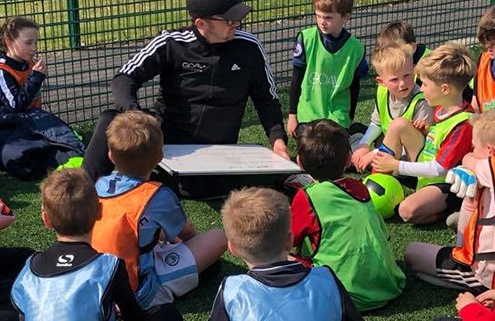Coaches or Teachers?
What makes a great football coach?
There is a common misconception that having played football at a high level means that you will be a great candidate to be a coach. This is not always the case, and often isn’t. What use is having all of that knowledge if you are not able to communicate with your players to pass your knowledge on. This is what coaching is, not only having knowledge of a subject, but understanding each individual you are working with. How do they learn? What motivates them? How can I connect with them? As Jose Mourinho once said, “You don’t have to have been a good horse to be a good jockey.”
Over the past few years we have seen many grassroots coaches start their football journey. Usually starting with a group of 6 year olds. Everyone of them has had the best intentions, but with varying degrees of success. Often (but not always) some of the best candidates have been those who work in education or support workers and other similar careers. So why is this? The answer is simple,they understand how children learn and how to communicate with them. They break down instructions to a language that a child can understand. They manage behaviour without having to lose their temper, and they hold the attention of the group from other distractions. On a football pitch we call them coaches, but really they are teachers, teaching the most fun subject in the world. This sounds easy, but it isn’t. It is extremely difficult to do and often takes years of training and practice to accomplish.
So often in grassroots football we see potential coaches with valuable teaching experience get overlooked by clubs in favour of a parent who ‘used to be a great player’. Whilst this knowledge is certainly helpful as the players get older, it offers very little benefit to a six year old who just wants to enjoy learning to play with their friends. This is another problem our coaches face, not only are they taking on the role of teachers, but they are often nursery/primary/high school teachers all rolled into one. The way we communicate with a 5 year old is very different to a 14 year old, as is the language that we use and the degree of difficulty in what they are learning. This is exceptionally difficult to do and any person willing to step forward and give this a try deserves some respect. Hopefully this thread will help them.
So as a parent taking your child to a new club/session how can you recognise a good coach? Here are some things to look for :
- What is the environment like? A good coach will create a fun atmosphere, often welcoming children with a smile and engaging with them as soon as they step on to the pitch. A good environment is crucial to learning, it helps a child feel safe and able to express themselves without fear of failure.
- Does the coach appear to be friendly? If a coach looks bored or frustrated this often translates to the players, being positive and excitable lifts the whole session and again it translates to the players performance and enhances the environment.
- Does the coach shout at the players? This is often a sign that the coach is struggling to control the group, a good coach/teacher will often focus on the positive behaviour in the group and encourage others to behave in the same way.
- Does the coach ask players questions? This can show that the coach understands how children learn, by encouraging players to find answers themselves creates a thought process and resonates deeper with the individual.
- How long does the coach spend talking to the group? Most sessions are maximum 1 hour long, this leaves very little playing time. Children have a very short attention span. All of this suggests that the players should spend more time playing than listening to the coach. A good coach will bring the players in for a 1-2 min discussion before sending them back to play and maximise their playing time.
- Does the coach take time to get to know their players. This will help them to understand each player, what are their insecurities? What motivates them? Remembering their name will immediately help the child to feel comfortable.
- Does the coach kneel/crouch to talk to the players? By literally getting on the same level as the players they become more approachable and less threatening to a child. By towering over them and talking down to a child they can create a barrier between themselves and the player.
These may seem like very small behaviours to look for but the importance of these really resonates with the players and are all deliberate strategies being employed by the coaches to create the environment. They often go unnoticed, but how the coach engages with the players is extremely important.




